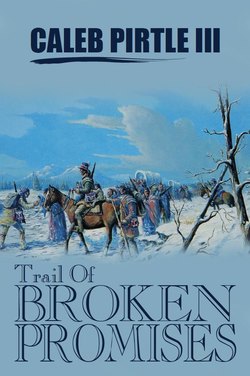Читать книгу Trail of Broken Promises - Caleb Pirtle III - Страница 9
На сайте Литреса книга снята с продажи.
Chapter 5: The Rebellious Ones
ОглавлениеSOME OF THE ancient ones were savage, tall and strong and, as one explorer reported, “The readiest and quickest of all people in going to shed blood. Such a male bestirs himself only when the devil is at his arse.”
The Choctaws broke away from the wild, young warriors who chased after death and glory. And the renegades became known as Chickasaw, the rebellious ones.
According to legend, the tribe had ventured from the land of the setting sun, led by two brothers, Chactas and Chikasa, following a mystical pole that was held by an invisible hand.
It was their compass.
It would direct them to a new home.
East of the Mississippi, the pole ceased its journey and stood still, planted firmly in unbroken ground. The tribes would move no more. Those who stayed with Chactas tilled the soil. And those who rode with Chikasa became hunters and fighters with raven black hair and large dark eyes.
The women dressed themselves in skins, sewn together by fishbone needles and deer sinews, wrapping themselves in buffalo calf hides when the winds grew cold and the frost gnawed at the earth. They gathered firewood and cleared the land, bringing home grapes, plums, wild onions, persimmons, walnuts, blackberries, pecans, and hickory nuts for the table.
The men had no time for a garden. They were warriors who wore breechcloth when the sun baked the woodlands, but used the shaggy hides of deer, bear, panther, otter, and beaver – the fleshy side out – to face the snows of winter.
They hung ornaments from their noses and ears, shaved the sides of their heads, soaked the crests of their scalps with bear grease, and carefully plucked the hair from their faces with tweezers fashioned from clam shells.
The Chickasaws worshiped Abalibnli and saw him in the sun and the clouds, even in a clear sky. For he who looked down from the clear sky had made all mankind from the dust of the mother earth, and the warriors swore to lay them all back into the dust again.
If a Chickasaw was killed, his death must be avenged. The warriors sought blood for blood, and they sought it often. It was the only way to chase away the ghosts of those slain in battle, the spirits who came to haunt them until a life had been laid down for a life.
One grave always begat another.
Dying, ironically, was a way of life.
The warriors found sanctification in an odd concoction of button snakeroot, and they drank it to purge themselves.
They heard old Chieftains encouraging them to be strong of heart, keen in sight, fleet of foot, to be cunning as a fox, sleepless as a wolf, agile as a panther.
The braves ate venison to make them swift, not trusting in the flesh of a clumsy bear at all.
With eagle feathers draped around their head and shoulders, the Chickasaws rode off to battle. It was their only chance for glory, and they found many glorious days.
James Adair, a trader, wrote that in a long chase, they would run “for two or three hundred miles, in pursuit of a flying enemy, with the continuous speed and eagerness of a staunch pack of blood hounds, till they shed blood.”
There were not many of them, never more than 4,500.
And they clung faithfully, desperately, to Mississippi, to the Old Fields.
The French feared them. The Chickasaws wanted to exterminate them and wash French blood for a sacred ground. In the 1740s, the Choctaws tried.
And the white men wondered just how long the savages could hold on to the land that held the sanctified graves of their dead.
For too many years, the agents of an American government
kept bringing fancy words in beautiful treaties as they sought to remove their Five Civilized Tribes from their homelands. The promises and guarantees within the treaties were easily made and easily broken.
Five Civilized Tribes Museum
Muskogee, Oklahoma
